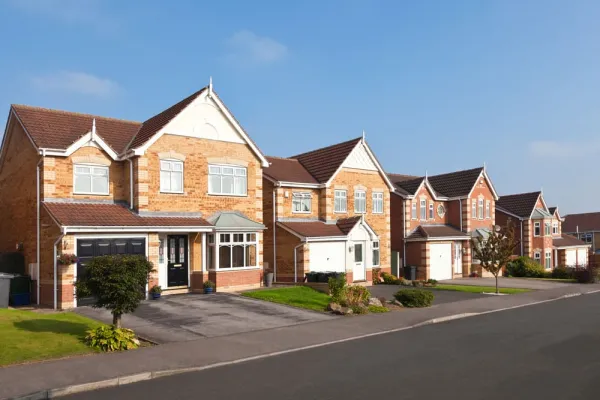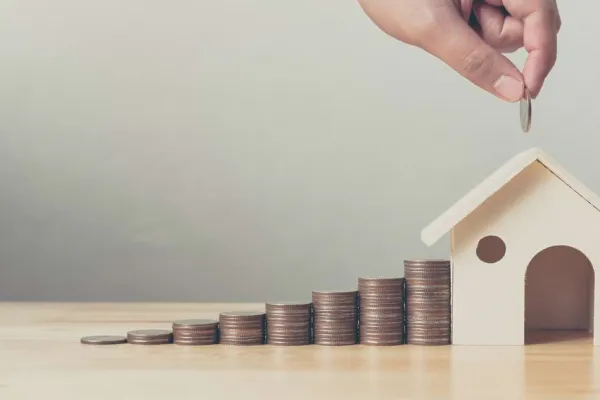The housing market took a blow in 2020, with the pandemic putting a brief pause on buying and selling. But this was quickly followed by a housing boom when markets reopened, lockdown restrictions were eased, and buyers were granted a cut to stamp duty rates.
But a year later, stamp duty is set to return to normal and activity has slowed since the post-lockdown flurry in summer 2020. So, does that mean we’ll see house prices dropping? Is there a UK house price crash on the horizon? We look into what’s happening with house prices and what’s on the horizon for the UK property market. As one of the leading online estate agents in the UK, we aim to sell your house for free, avoiding the costs associated with high street vendors. Read on below to see how the market is moving and whether now is the best time to look at property.
What Are the Current Average UK House Prices 2021?
Government data shows that, on average, house prices have increased 4.5% from May 2021 to June 2021. In the same period last year, the average house price increased only 1.4%.
There has been an annual price rise in the UK of 13.2%, with the average property valued at £265,668. The area with the strongest annual growth was in the North West of England, where prices increased by 18.6% to June 2021. The lowest growth was in London, where prices increased by 6.3% in the year to June 2021.
Buyer demand remained strong throughout the summer, with the usual slowdown caused by summer holiday activities averted with fewer people going abroad. There was a 56% increase in demand in August 2021 compared to August 2019, down just 17% from the post-lockdown activity in August 2020. Research from Nationwide has shown that house prices are currently 13% higher than at the beginning of the pandemic, with an average price of £248,857 compared to £244,229 last year.
The Impact of the Stamp Duty Holiday
The house price rise in August has been a shock to housing experts, as it was anticipated that the tapering of stamp duty relief in England in June this year would slow the market down. Since June 2020, most property buyers were given a tax break on their property with a suspension on stamp duty. This summer saw rates begin to return to normal and the stamp duty holiday will end completely by October. This is also when the furlough scheme is due to finish. It would be expected that both these factors would contribute to a decrease in housing market activity in the autumn and a decrease in UK property prices.
However, due to such increased demand throughout the stamp duty relief period, there is now a shortage of available properties. There is currently a 24% decrease in the supply of homes compared to average levels last year, with a third fewer new homes coming to the market in June this year. This shortage in supply with no reduction in demand is what unexpectedly drove up house prices in August. There has been no clear indication that supply will increase to meet demand, so it’s possible that this growth will continue.
Experts are conflicted about what all this means for house prices in autumn 2021. Some predict that due to the economic issues around stamp duty and furlough ending, we will see house prices fall to what they were before the pandemic began. Others forecast that growth will probably slow in the coming months but that doesn’t mean that there will be a house price crash and we won’t see a return to pre-pandemic prices.
The Changes in Housing Requirements
The requirements for buyers have dramatically changed as a consequence of the pandemic. With people spending more time inside and a rise in working from home, buyers are looking for homes with more space. This has seen an increase in demand for two-and three-bedroom homes and also properties that have outdoor space. Many people are also choosing to move out of cities into rural areas, where buyers will be likely to find more room for their money, both indoors and outdoors.
A survey by Royal London showed that 51% of those moving into a house were looking for more indoor space and 46% were looking for more outdoor space. 57% of movers in Belfast, 53% in Cardiff and 46% in London were looking to move to a more rural area. This increased demand for properties in rural areas has meant that prices have also increased.
What’s Next for The UK Property Market?
Research has found that, in the long run, this growth will remain. The average UK house price is set to increase by 30% by 2031 and continue to increase through to 2040. The average cost of a home for first-time buyers is currently £248,496. In 2031 this is expected to rise to £323,718. In London, the current average house price is £465,549 and is expected to rise to £619,568 in the next 10 years.
However, forecasting the housing market is notoriously difficult. Some experts warn that just because we have not seen a downturn in prices throughout the pandemic, that does not mean we can be confident that prices will continue to rise. It’s possible that growth is being over-predicted and external factors such as a shock financial crisis will knock the economy, which will also affect house prices.
If you want to make the most of the current upturn on property prices in the UK, SOLD.CO.UK can sell your house online, for free- No costs to you whatsoever! Get an instant valuation of your property today or contact us to speak to our expert team.
















